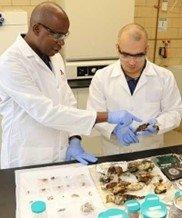
Many people are unaware of how complex and cost-prohibitive recycling can be. Recycling processes may also involve hazardous acids that can be harmful to the environment, especially when it comes to recycling electronic waste (e-waste). This is where leaders at the Critical Materials Institute (CMI), with funding from the Advanced Materials and Manufacturing Technologies Office (AMMTO) and Iowa State University, come in. CMI is exploring new ways to recycle that are greener for the environment, better for businesses, and critical for a clean energy economy.
Since 2016, CMI has been working on acid-free dissolution recycling (ADR) and chemical recovery of rare earth elements (REE), critical materials found in magnets in e-waste. REE magnets are critical components for electronic items such as cell phones and hard disk drives and clean energy technologies like offshore wind turbines. The demand for REE magnets is expected to increase significantly, as discussed in DOE’s 2022 supply chain report on neodymium magnets. However, their supply chain is not always reliable; partly due to the limited supply sources of REEs. There are extensive benefits to recycling REE magnets – if done correctly, it can be an environmentally preferable solution, and it can tackle concerns and challenges surrounding accessibility of REEs.
TdVib and Ames’ combined efforts to scale up the recycling process without any acids and limit, or even eliminate, the generation of any waste makes for an overall greener and environment-friendly process. This recycling process also removes the need for pre-heating, which sets it apart from other recycling processes used to demagnetize REE magnets. The ability to eliminate pre-heating lessens the impacts of pollution, while also decreasing energy usage.
Link to the full story: Acid Free Dissolution Recycling: A Second Chance for Rare Earth Elements
